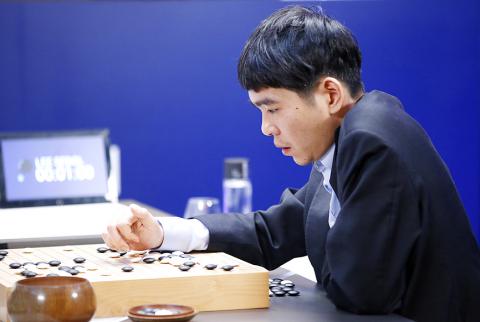Google’s go-playing software yesterday defeated a human champion for the third straight time to clinch the best-of-five series and establish its superiority in an ancient Chinese chess-like game long thought to be the realm of humans.
Lee Sedol of South Korea, who is one of the world’s best go players, remained winless against AlphaGo, Google DeepMind’s artificial intelligence machine, after another close match in Seoul. Despite losing the series, Lee is scheduled to play twice more against AlphaGo, today and on Tuesday.
The showdown between human and machine has crushed the pride of go fans, many of them in Asia, who believed go would be too complex for machines to master. Some thought it would take at least another decade for computers to beat human go champions.

Photo: AP
Many top go professionals commented that AlphaGo displayed unorthodox, questionable moves that initially befuddled humans, but made sense in hindsight.
Lee looked shaken in the post-match news conference, apologizing to his fans for what he said was a “powerless display” against the game-playing machine.
He said he felt extreme pressure heading into the third match, but that with the series now decided, he might have a better chance in the final two matches, because “the psychological part matters to humans.”
Google cofounder Sergey Brin, who was in Seoul to watch the third match, described go as a “beautiful game” and said he was excited that the company has been able to “instill that kind of beauty in our computers.”
In go, which is considered to be far more complex than chess, two players take turns putting black or white stones on a 19-by-19 square grid. The goal is to put more territory under one’s control by surrounding vacant areas with the stones.

EUROPEAN TARGETS: The planned Munich center would support TSMC’s European customers to design high-performance, energy-efficient chips, an executive said Taiwan Semiconductor Manufacturing Co (TSMC, 台積電), the world’s largest contract chipmaker, yesterday said that it plans to launch a new research-and-development (R&D) center in Munich, Germany, next quarter to assist customers with chip design. TSMC Europe president Paul de Bot made the announcement during a technology symposium in Amsterdam on Tuesday, the chipmaker said. The new Munich center would be the firm’s first chip designing center in Europe, it said. The chipmaker has set up a major R&D center at its base of operations in Hsinchu and plans to create a new one in the US to provide services for major US customers,

The Ministry of Transportation and Communications yesterday said that it would redesign the written portion of the driver’s license exam to make it more rigorous. “We hope that the exam can assess drivers’ understanding of traffic rules, particularly those who take the driver’s license test for the first time. In the past, drivers only needed to cram a book of test questions to pass the written exam,” Minister of Transportation and Communications Chen Shih-kai (陳世凱) told a news conference at the Taoyuan Motor Vehicle Office. “In the future, they would not be able to pass the test unless they study traffic regulations

GAINING STEAM: The scheme initially failed to gather much attention, with only 188 cards issued in its first year, but gained popularity amid the COVID-19 pandemic Applications for the Employment Gold Card have increased in the past few years, with the card having been issued to a total of 13,191 people from 101 countries since its introduction in 2018, the National Development Council (NDC) said yesterday. Those who have received the card have included celebrities, such as former NBA star Dwight Howard and Australian-South Korean cheerleader Dahye Lee, the NDC said. The four-in-one Employment Gold Card combines a work permit, resident visa, Alien Resident Certificate (ARC) and re-entry permit. It was first introduced in February 2018 through the Act Governing Recruitment and Employment of Foreign Professionals (外國專業人才延攬及雇用法),

‘A SURVIVAL QUESTION’: US officials have been urging the opposition KMT and TPP not to block defense spending, especially the special defense budget, an official said The US plans to ramp up weapons sales to Taiwan to a level exceeding US President Donald Trump’s first term as part of an effort to deter China as it intensifies military pressure on the nation, two US officials said on condition of anonymity. If US arms sales do accelerate, it could ease worries about the extent of Trump’s commitment to Taiwan. It would also add new friction to the tense US-China relationship. The officials said they expect US approvals for weapons sales to Taiwan over the next four years to surpass those in Trump’s first term, with one of them saying